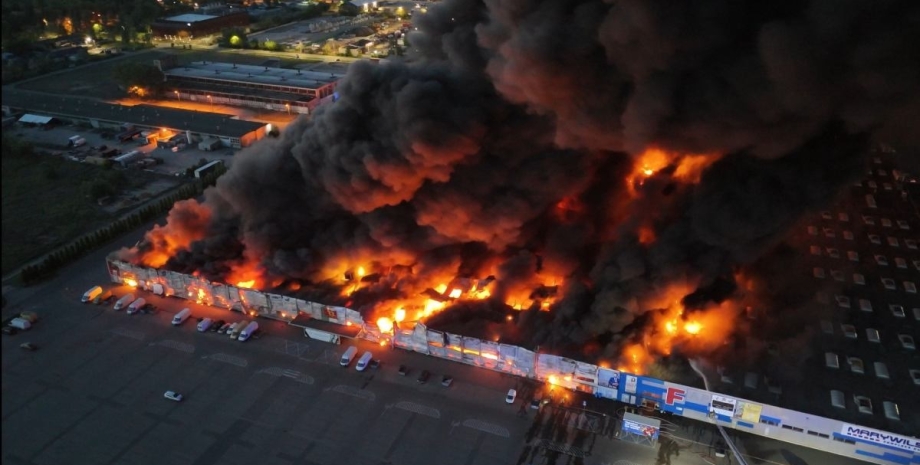
After a destructive fire at IKEA in Vilnius, which happened on May 9, Polish Prime Minister Donald Tusk said it could have been arson to which Russia was involved. He noted that in Poland, nine suspects were already delayed and charged, who were "directly involved on behalf of Russian services in sabotage", - said Tusk TVN24 on Monday. "These are citizens of Ukraine, Belarus and Poland," Tusk said, adding that some of them may have been recruited from criminal circles.
According to Tusk, the detainees are accused of "beating, arson and attempts of arson" not only in Poland, but also in Lithuania, Latvia and possibly Sweden. Among the examples of sabotage, Tusk called an attempt to set fire to the production of paint production in Wroclaw in the west of Poland, a fire in the shopping center in Warsaw, as well as a fire in IKEA in Lithuania on May 9. Lithuanian President Gitanas Nauseda said such incidents could be repeated.
He noted that the perpetrators of crimes are very cautious and difficult to track. "These things are planned, those who plan them want sabotage to be successful," he said. Although there is no evidence that any of these incidents on the continent have been coordinated, security services believe that they may be part of Moscow's attempt to destabilize the event that supported Ukraine.
They point out that after the Cold War, the surgery of external intelligence consisted of spies and their associates, but in the era of social networks of vandals can be hired, leaving little connections with other attackers, since saboteurs can now be paid in cryptocurrency.
Increasing concern that these hybrid attacks can be a matter of Russia's hands, so great that this issue was raised at the Summit of Foreign Affairs and Defense in Brussels this week, with the staff of the Netherlands, Estonia and Lithuania. One minister who asked not to be called his name said they were deeply concerned about "sabotage, organized, funded and carried out by Russian proxy.
" In addition to recent incidents, it is also known about the arrest of a British in April, which was accused of trying to arson two warehouses associated with the Ukrainian businessman, in an industrial zone in Leiton, Eastern London. It is expected that it was recruited by Russian intelligence. The royal prosecutor's office stated that he "engaged in actions aimed at enterprises related to Ukraine to benefit the Russian state.
" On Tuesday, Estonia Defense Minister Hanno, Pikus, present in Brussels at the EU Defense Summit, said his country had already been a victim of Russian sabotage. "They performed similar operations in Estonia. They hired 10 people to attack the Minister of Internal Affairs and a journalist car. It is a normal Russia's behavior. Unfortunately, we must understand that Russia is becoming more aggressive against European countries as well as NATO countries , - he said.
He meant the February incidents when the windows of the car owned by the Interior Lauren Laurentz and a local journalist were broken. Six people, including Russian citizens who have double Russian-Estonian citizenship, were arrested shortly afterwards. In Germany, it is suspected that Russia was behind a wave of cyberratak in 2023. And in April, two citizens of Germany and Russia were arrested on suspicion of preparing sabotage attacks, in particular on a military base in Bavaria.
The main suspect is accused of preparing an explosion, arson and maintaining contacts with Russian intelligence. In France, investigators find out whether there were anti -Semitic graffiti, depicted at the Holocaust Memorial in Paris last week, ordered by the Russian Security Services.
These are the echoes of the last year's attack, when David's star was painted from cans on buildings in Paris and its surroundings, which caused fears about the repetition of attempts by the Nazi era to identify the homes of the Jews. Later, the authorities stated that, in her opinion, the attack could be a "demand" of a person who lives abroad. These incidents, as they fear in Europe, exacerbate the already spreading misinformation campaign.
On Wednesday, several schools around Athens were evacuated after false information about the bomb. Police associated this trick with the Russian server and stated that it was aimed at "violation of public order". EU countries are tracking these events. The National Lithuanian Crisis Center has warned enterprises, including shopping centers and organizations that support Ukraine, to increase vigilance.
On Monday, the National Coordinator of the Netherlands on Security and Terrorism warned of the risk of subversive operations in the Netherlands, including "espionage and preparing positions for sabotage of vital infrastructure. " On Tuesday in Brussels, the Minister of Defense of the Netherlands Kaisa Ollogren said that Russia was "trying to intimidate" NATO country. "Yes, we are vulnerable. I think we are all. We have a vital infrastructure.
We have marine infrastructure, there is electricity, water supply, we are vulnerable to cyberattacks. We now see in a number of European countries that Russia is trying to destabilize us , as well as to intimidate us. NATO Secretary General Jens Stoltenberg also pointed his finger on Moscow. "We see increased activity of Russian intelligence throughout the Alliance. Therefore, we have increased our vigilance," he said.










All rights reserved IN-Ukraine.info - 2022